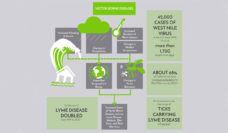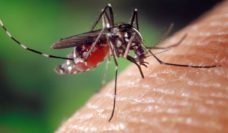As the brutal Northern winter melts away and Wisconsinites are freed from their homes to hike the timberland forests, Dr. Lyric Bartholomay can be found spending her spring and summer a bit differently than most. As a medical entomologist at the University of Wisconsin, she spends warmer months tracking, recording, and studying the mosquitoes and ticks that cross our paths during time spent outdoors. Mosquitoes and ticks are more than just skeevy nuisances. They can carry and transmit to humans a variety of bacteria and viruses. Knowing which vector species are present, how prevalent they are, and which bacteria and viruses they are carrying is paramount to informing the public of their risk for mosquito and tickborne illnesses.
“People’s perceptions of vector-borne diseases ebb and flow,” she reminds us. “When West Nile hit in the late 1990s, everybody knew about it. It was in all of the newspapers. Then we started to see fewer cases, and people just assumed West Nile was gone.” Unfortunately, this wasn’t the case. In 2019 alone, there were almost 1,000 cases of West Nile virus identified in 47 states and Washington.
Ignoring the risk these tiny villains pose can have grave consequences. Dr. Bartholomay explains, “The thing with mosquito-borne diseases is that not a huge number of people get infected, but those people who get infected can get really, really sick – even permanently disabled.” Lyme disease, a tickborne illness that infects around 30,000 people in the US every year, can leave individuals with severe headaches, facial paralysis, joint pain, heart problems, dizziness, and nerve pain for weeks, months, or longer if left undiagnosed and untreated.
The Zika virus, which can cause devastating birth defects, is transmitted to humans by a species of mosquito found in the US. Dr. Bartholomay and her team recently spotted the species in Wisconsin for the first time and linked its entry into the state to human behavior, traced back to large tractor tires that were harboring the mosquitoes. As a result of growing fears of vector-borne illness after the Zika virus epidemic in 2016, the CDC invested $10 million in Dr. Bartholomay and her research partner, Dr. Susan Paskewitz, to establish a Research Center of Excellence to train new professionals, conduct research, and expand vector surveillance throughout Iowa, Illinois, Michigan, Minnesota and Wisconsin.
Knowing which vector species are present, how prevalent they are, and which bacteria and viruses they are carrying is paramount to informing the public of their risk for mosquito and tickborne illnesses.
In addition to research, Dr. Bartholomay’s team works to educate the public and provide tools for homeowners to safely protect themselves from the unwelcome backyard inhabitants. She notes the importance of residents knowing what they can do in their own surroundings to reduce their risk of disease while protecting endangered pollinators, like bees, who are necessary for agriculture but are often harmed as a consequence of insecticide use targeted at mosquitoes. The team at the University of Wisconsin also developed The Tick App, a resource through which users can submit photos of ticks they encounter and receive species identification and information on disease risk.
Between training the up-and-coming workforce of professional medical entomologists and keeping the public informed and safe, Dr. Bartholomay can be found inspiring the next generation of insect enthusiasts through an early science education program she founded with Dr. Katherine Richardson Bruna of Iowa State University. The pair teamed up to develop curricula and summer camp programs serving underprivileged communities in Des Moines, Iowa. They focus on teaching kids to never stop asking questions. “Kids need that spark for science when they are younger,” she says. By encouraging kids to ask questions it gives them a “sense of ownership of their knowledge.”
Dr. Bartholomay’s own spark developed from being raised to “notice the little things in life,” by parents who appreciated nature’s small wonders. She was inspired by childhood visits to the Mississippi River where she witnessed the annual emergence of mayflies which hatch from the water in such a coordinated mass that they can be detected by satellite. “It’s incredible!” she recalls. The mayflies live only 24 hours. Bartholomay says insects teach us that “life is short. Do it well and do it right.”
Photo courtesy of Lyric Bartholomay














